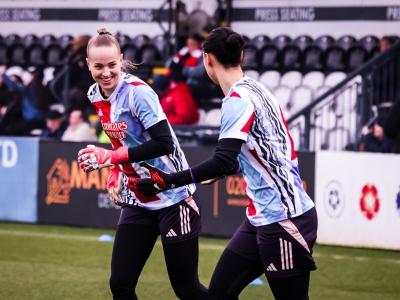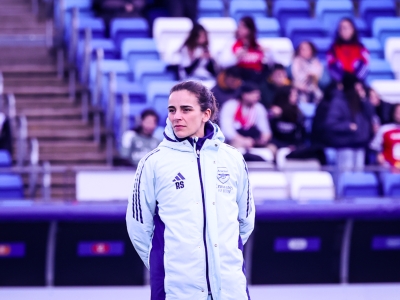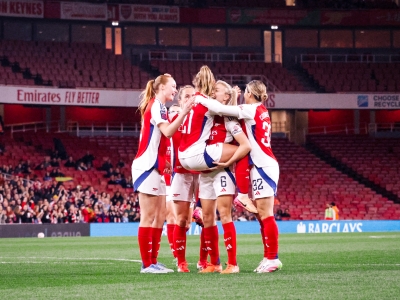(Ed’s note – This piece refers to the table in the image box below. As I have no idea how to format a table for insertion in the admin system we use to post pieces on this here website, I did a screen grab and have reproduced the table that way. However, if the details are too small to read, you can download a larger version of the table in pdf format, by clicking here.)
Perhaps the most enlightening content of the Fulham programme was the interview with Ivan Gazidis. Of particular interest to me were the following quotes, setting out some of the values and targets of the Club:
“The entire focus of the Club is achieving success on the pitch – that’s what we exist for.”
“Our fans are much more than customers or consumers – they are part of the Club – and the strength of our relationship with our fans will define our strength as a club. We’re deeply engaged with our fans listening to how we can improve their experience and interaction with the Club. The ongoing process of Arsenalisation is one element of that.”
Since there has been obvious discontent recently, I began to consider whether there has been a discernible move by the Club to justify Mr Gazidis’ views and in the event that it has not, when a definable “tipping point” was reached. In doing so, I have attempted to compile some simple statistics.
I have chosen to compile the statistics since season 2002 / 2003 – arguably the point at which Arsenal approached the peak of their recent achievements: the season of The Invincibles. The League position is a clear barometer of Ivan Gazidis’ stated main aim.
Sales and purchases refer to players – notwithstanding (for the sake of simplicity) player loans and players released from contracts. I do not claim to present an all encompassing analysis; rather, an indication of the basis upon which fans might reasonably judge whether sufficient investment is being made in the team. Mr Gazidis has recently stated that there are funds available for investment in the team – at the behest of Arsene Wenger. Of course, action speaks louder than words. With that in mind, a review of what has gone before affords an indicator. Clearly, the period examined includes the very period when Arsenal invested monumentally to enable the move to the new stadium – the vision being that we could compete with the very best.
Over the period, the most significant surplus followed the sale of Kolo Toure and Emmanuel Adebayor – as reflected in the “Balance” column. In football terms, I would suggest that the decision to countenance their departure – with understandably contrasting reaction – has proven to be vindicated. Largely, the books appear to have been balanced, Arsenal having continued to spend cautiously – Andrey Arshavin our record signing, believed to be at a modest £15 million. Whilst this figure is dwarfed by the reported £80 million which Real Madrid parted with for the services of Cristiano Ronaldo, there is a general acceptance that Arsenal do not (and presently, cannot) operate in that stratosphere.
It has been widely acknowledged that the wage bill at Arsenal is broadly speaking comparable to other top clubs – with numerous players recently signing “long term” contracts. Pertinently, many would question the extent of the value which such a policy affords – players of a certain mindset tending towards exaggerated comfort arising from the security such deals bring. However, since Arsene Wenger has, in recent years added the role of futures dealer to his multi – faceted job description, this is a natural by product of his philosophy.
So, should we satisfied with the current state of affairs and if not, when did the groundswell of opinion shift from “Arsene knows”, to many adding the suffix representing what has been won in the last five years? I do not propose to dwell on the answer to the first question – I have suggested previously that we are falling short of where we should be. Rather, I am concerned here with the point at which dissatisfaction may have become the preserve of the majority, as opposed to the arguably prophetic views of Myles Palmer.
The fine lines which govern sport and wider realms dictated that Arsenal were unfortunate not to win the Champions League in 2006. This first of several “near misses” was the result of bad luck, in my opinion – based upon the need to assume that there were no darker forces at play which saw Jens Lehmann dismissed early in the game. Cardiff, in 2007, again bore witness to a 2 – 1 reverse which may have been eminently more avoidable. Since then, cup campaigns have lacked ultimate credibility and title challenges have staggered akin to the vagaries of the most debauched of stag dos: what started with promise and bravado has ended with collapse and overwhelming nausea.
Leaving Highbury has no doubt consigned the Club to a “sausages today, caviar tomorrow” approach. As a preference, this is still favourable to the model of dependency and moral bankruptcy or alternatively, huge debt operated by others. Results announced for the six month period to 30 November 2009 included a reduction of the debt consequent of the move to the new stadium (and attendant projects) from £332.8 million as at 31 May 2009, to £203.6 million. On that basis, there is little cause for complaint.
As highlighted by the Club, the sale of part of the Queensland Road development site means that the Group's other property activities are now debt free. Commendable results for a property company – but where does the Football Club fit in? Ivan Gazidis’ first quote above gives the answer. This is where the resentment arises, in my view.
Consider the other three columns of statistics shown above. Although the Club have, in broad brush terms, balanced the books, examine the “Ins / Outs” column. Notwithstanding the (in)comparable(?) quality of the squad compared to that of 2004, the sheer lack of numbers does not add up. This has been calculated purely on the basis of players bought and sold. Quite simply, with the exception of season 2008 / 2009, there has been a deficit in this respect in each and every season. Based upon this crude calculation, the balance of numbers since 2002 has seen 46 more departures than arrivals. This would suggest that claims of players yet to break into the first team squad over – earning, if not under achieving may be accurate, in light of wages paid. When you consider the bare bones upon which we were forced to rely in the closing weeks of this season, the prognosis becomes irrefutable. On the face of it, there has been a worrying lack of strength in depth, despite the potential quality of our starting eleven.
There will be departures this summer. I suspect that Manuel Almunia and Eduardo will move on, as well as at least two centre backs. Chamakh may well be a replacement, not an addition. The frustration is that a Club named fifth richest in the last Deloitte Football Money League – and third richest according to a more recent survey by Forbes – is settling for a Champions League spot, when at least the ability to challenge is craved.
The currency of football is trophies, not possession or promises. Since 2005, we have had none of the former, whilst the latter two have not delivered. I read the list of Ivan Merc compiled quotes that could be downloaded from Kevin Whitcher’s most recent editorial with a wry smile. It had saved me a job and served to focus the answer to my second question.
Arsene Wenger has indulged himself in various promises on possible transfers, his latest being:
“We want to improve our quality this summer. It is not necessarily a large number of players that we need to buy but I believe you don't win the title when you concede 40 goals. Leave the transfer business to me and when you come back in July for the Emirates Cup you will see.”
We have been looking since 2005. By definition, going unbeaten is, domestically, as good as it gets. The arguable reduction in quality since then and indisputably, in numbers; juxtaposed with the increasing wealth has been fanning the flames of discontent. They have spread, whilst Arsene Wenger has continued, proverbially, to fiddle. With the “wow” factor from the new stadium now expired, there is need for improvement to be seen on the big green bit in the middle. The last few weeks have been the culmination of growing frustrations, I believe inextricably linked with the move.
All credit to the Club for listening to the fans – the continued “Arsenalisation” of the stadium is appreciated and no home is complete without a few paintings on the walls. In the near future – next season – we need to put some silverware on the sideboard. The Club have acknowledged that the first phase of the move is over. Let us hope that the transition ends here and real success returns. If you are listening, Mr Gazidis, then I would conclude by saying that the frozen ticket prices are indeed commendable, although the cost is still considerable – a topical refrain. The marketing phrase is, I believe, “value for money”. Last I heard, there really are no prizes for third or fourth, or even second.







